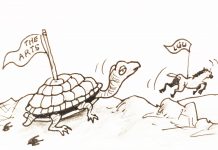They grin under cameras’ eyes, tidily attired and dignified, swearing on their honor that they did not take a penny. They deny, deflect, and play-act innocence as if innocence were a matter of words. Though their words are empty to the viewing public, they are reduced to memorized lies from a line long rehearsed by those with expertise in deception in public life.
The same play happens every time the exposé breaks, the evidence accumulates, and the government target appears before the press, seething with indignation at what they describe as their own integrity. “I didn’t steal,” they declare, as if repeating the mantra often would somehow reshape reality. They cite the decades of public service, self-sacrifices, and “clear conscience.” Behind the guise, however, lies a life that barely corresponds to the image of humble service. Mansions are built, limousine fleets are duplicated, and bank accounts flourish—none of which match their alleged salaries. Denial, then, is not just unlikely but also insulting.
It is not the accusation that makes their statements difficult to believe, but rather the conditions under which they exercise power. These are men and women with enormous authority over the government coffers, entrusted with authority enough to sway courts, bureaucracies, and even the popular perception. They are the ones who sign the checks, the ones who make the bid awards, and the ones with influence who silence auditors. In a land where the right of the strong is impunity, their denials are as helpful as smoke from an ardent field—may hide the fire for a while, but not kill it.
Their rapid amassing of wealth is the most vigorous protest against them. Most of these officials remake themselves from modest civil servants into billionaires of unknown provenance within a few years. People see their children studying in exclusive universities abroad, their families on summer vacations in luxury, and their businesses thriving overnight after their political rise. They refer to it as “hard work” or “sensible investments,” but the public can well see beyond words. It is corruption if it is gained in office without accountability, and their denials are no more than the first defense of a guilty mind.
Filipinos, to their credit, are wiser and more prudent now. Decades of duplicity have inured citizens to read between lines, suspect what one says and, more importantly still, what one does not say. Deception, of course, has been the currency of corruption. Thieves in public office do not bear guns or crack safes—they steal on lies, on the inventions of untruths, and on the manipulations of appearance. The barong Tagalog thief swipes not by violence but by the allure of appearance and the shield of alliances.
There is, though, a grotesque turn of humor in how such officials invoke God, family, and country to exonerate themselves of malfeasance. They cloak themselves in the idiom of goodness to hide their vices. One invokes divine guidance; another, commitment to public service. But the lips that spoke God’s name are the same lips that signed fictitious documents and certified phony projects. It is a hypocrisy of the nation, and its people, tired but not blind, discern.
The irony is that such implausible denials linger in a system rotten with selective justice. Investigations get bogged down, cases linger, and witnesses get bullied or discredited. The truth is on sale, buried under influence and red tape. For the common man, justice appears elusive and mythical—something true in theory, not reality. And thus, the same people continue to stay in power, voices ring out in innocence, and robberies go on, rebranded under different names and regimes.
But the truth, suppressed as it might be, has a habitual knack for reasserting itself. The country needs to build a citizenry that will not forget, demands openness, and ceases to take comfort in political melodrama. Public office is not the theatre of performance but a responsibility demanding accountability. Next time a government official says, “I did not steal,” the public must not only hear—but verify, question, and recall. In a country where lies have been a weapon for so long, the most powerful act of defiance is to stop believing it.




